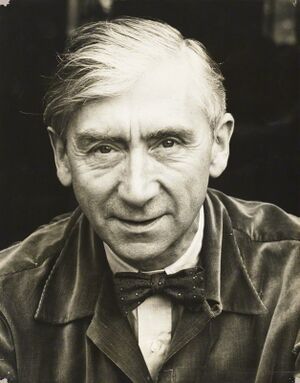Herbert Read
Herbert Edward Read (Kirbymoorside, Gran Bretagna, 4 dicembre 1893 – Stonegrave, Gran Bretagna, 12 giugno 1968) è stato un anarchico, poeta e critico letterario britannico.
Biografia
Figlio di un agricoltore, dopo la morte del padre frequenta una scuola per orfani di Halifax ed a soli sedici anni viene assunto in una banca di Leeds. Il lavoro non gli impedisce di proseguire i suoi studi, studiando la sera e arrivando sino alla laurea all'università di Leeds nel 1914.
Intraprende l'attività di poeta e scrittore, che però viene interrotta bruscamente nel corso della prima guerra mondiale dopo la pubblicazione di Chaos (1915). Read combatte in Belgio e Francia, raggiungendo il grado di capitano. Durante la guerra fonda con Frank Rutter un giornale, Arts and Letters, con cui attacca le posizioni britanniche conservatrici. Dopo la guerra lavora in diversi settori ed approfondisce, pubblicando diversi lavori, tematiche riguardanti Kropotkin e Jung.
La sua prima dichiarazione in favore dell'anarchia risale al 1937, quando si schiera anche apertamente e pubblicamente contro i reazionari di Francisco Franco in Spagna. La sua conversione all'anarchismo sarebbe dipesa in primis dalla lettura di un libello di Edward Carpentier: Non gouvernemtal society (1911). Assistente aggiunto del Victoria and Albert Museum di Londra, lavorerà come professore di Belle Arti a Edimburgo e insegnante in varie università inglesi.
Alla fine della seconda guerra mondiale, dove assume posizioni pacifiste, critica il marxismo reiterando le proprie posizioni libertarie. Tuttavia, nel 1953, accettando l'onorificenza di knighthood (Cavaliere) per i servigi resi alla letteratura, riceve l'ostracismo di gran parte del movimento anarchico. In questo periodo si occupa di vari settori di lavoro letterario da lui sviluppati.
Pensiero
Filosofo politico e pedagogo, ma anche poeta, esordendo sotto l'influsso di Th. S. Eliot (alla cui rivista The criterion collaborò) e uomo di lettere. Tra le raccolte successive: Thirty-five poems (1940); A world within a war (1944); Moon's farm (1955). Convinto assertore dell'utilità della psicanalisi per la critica, Read pubblica moltissimi studi su arte, estetica, anarchia (Poesia e anarchismo del 1938; Filosofia dell'anarchismo del 1940; L'educazione attraverso l'arte del 1943; Rivoluzione e ragione del 1953; Il mio anarchismo del 1966; ecc.) e la letteratura del suo tempo.
Herbert Read ha inoltre sviluppato un forte interesse per il tema della pedagogia e in particolare per l'arte come mezzo d'educazione, la cui critica è strettamente legata alla critica della società . Attribuendo un ruolo centrale all'arte (secondo Read la percezione artistica è prerogativa umana universale e non strettamente legata a pochi individui, i cosiddetti artisti), egli pensa in questo modo di sostituire all'educazione della mente l'educazione dei sensi.
Il suo anarchismo è stato influenzato da William Godwin, Petr Kropotkin e Max Stirner ed a sua volta ha influenzato anarchici britannici importanti come Colin Ward.
Opere
Vi sono ancora molte opere inedite e che verranno pubblicate
|
|
